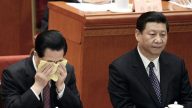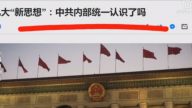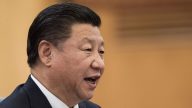【新唐人2014年10月21日讯】中共十八届四中全会10月20号到23号在北京召开,这是从上个世纪七十年代以来,召开时间最晚的一次四中全会,也是中共全会历史上,第一次将“依法治国”作为主题进行讨论。事实上,“依法治国”已经被中共多次作为执政口号提及,不过目前中国仍然没达到“依法治国”,原因到底是什么呢?
由于十八届四中全会的召开,“依法治国”20号一跃成为在大陆媒体上出现率最高的词汇之一。
事实上,“依法治国”这个词早在1979年,就被中国学术界提出。之后中共在1997年,将“依法治国”写入十五大的报告中,作为治理国家的基本方略。两年后,九届人大二次会议,将“依法治国”写入宪法。之后在十六大、十七大和十八大的报告中,也都反复提到过“依法治国”。
距离97年的十五大报告,已经过去了17年。那么17年中,中共实践“依法治国”的成效如何?
东南大学法学教授张赞宁:“现在中国的法治现状非常糟糕。政府和司法机关都没有严格依法办案。侵犯公民合法权益的现象随处可见。”
旅美国知名媒体人北风:“是不是真正的‘依法治国’,我们不是要看它说什么,而是要看它做什么。最近这两三个星期以来,超过七、八十国内的民众,因为声援、或者支持香港占中运动,而被当局刑事拘留,并且都是寻衅滋事罪。这毫无疑问,看出来并不是依法治国。”
那么是什么原因,让“依法治国”的口号经历了这么长时间,仍然没能在中国实现呢?
东南大学法学教授张赞宁:“造成中国长期不可能依法治国,而且所制定的现行法律也不可能真正落实、执行的主要原因,就是一党专政。司法不独立。中国的司法,公、检、法、司,这几家都要听命于某一个政党,某一个组织,这样的法律,那就是不可能有真正的公平、正义可言,也不可能(有)真正的法治可言。”
“党大于法”、“司法不独立”也一直受到国内法学界和民间的批评。四中全会召开前,《财新网》、《新京报》等多个国内媒体,都刊登了国内法学专业人士对会议的建议,不约而同的提到“党要守法”。也就是中共自身的权力必须要受到法律的约束。
北风:“这两天有网友说,那你能不能首先中国共产党依法登记注册,成为一个可诉的主体。比如说,当民众对党的方针政策有什么不满的时候,大家能够通过司法渠道来解决问题。但是我们也知道,这一点是不大可能做的到。那在中国一个显而易见的东西就是,你首先共产党能不能在法律框架内活动,没有垄断和超越的法律地位,如果可以,那我想,依法治国才能够开始谈起,否则一切都是空谈。”
除了是否能使中共权力真正受到约束之外,这次会议强调的“依法治国”,对像究竟是官还是民,也是外界正在观察的。
“法治三老”之一、86岁的郭道晖对国内媒体说,依法治国的要害或者关键,是要依法治国家权力。国家权力的载体是国家的官员,所以首先要依法治“官”。但是这个概念并没有被官员接受。
而中国人民大学政治学教授张鸣对“德国之声”表示,当局主要是想依靠法律来更好地统治民众。所谓的“法治”就是“以法治民”。要想把这方面扳过来,还有很长的路要走。张鸣表示,真正的法治,首先要求执政者必须守法。
采访编辑/尚燕 剪辑/舒灿
Why Is It So Difficult To Carry Out “Rule by Law"?
Between Oct 20 and 23rd, the 4th Plenary Session of the 18th
Chinese Communist Party (CCP) Central Committee,
is being held in Beijing.
This is actually the first time in CCP plenary sessions
history, to discuss the topic “rule by law".
Although “rule by law" has been mentioned as the ruling slogan
of CCP many times over the years,
now is the first time it is being discussed.
China still did not reach the status of “rule by law",
so what reasons are there for this change?
Since the 4th Plenary Session of 18th CCP being held,
“rule by law" has become one of the terms used with the highest
degree of so called importance,
according to mainland media since Oct. 20.
In fact, the term “rule by law” was proposed
by Chinese academia as early as 1979.
In 1997 “rule by law" was written into the 15th CCP
Conference Report,
as one of the basic strategies of governing the country.
Two years later, the Second Session of the Ninth
National People’s Congress,
revised the constitution by adding the “rule by law".
In the following 17th and 18th Conference Reports,
“rule by law" was also repeatedly mentioned.
From the time of publishing 15th CCP Conference report
in 1997 to today, 17 years have since passed.
So during these 17 years, how did the CCP practice
“rule by law" ?
Southeast University law professor Zhang Zanning:
“Now the status quo ‘rule by law’ in China is very bad.
The Government agencies and judiciary system
are not strictly in accordance with the law
to implement the administration.
The phenomenon of infringing
the citizen’s legitimate rights is pervasive."
Well-known media worker Bei Feng is now living
in North America.
He says: “For the topic of whether it really is ‘rule by law’ or not,
we need to look at what it has done rather than what it says.
During the past two or three weeks, more than seventy
to eighty people in Mainland China
have been punished with criminal detention by the crime
of disturbing the peace and provoking conflict,
due to supporting Occupy Central in Hong Kong,
which is easily seen, no doubt, as no rule by law. “
So what reasons led to the failure of achieving “rule by law"
after the slogan was used in China for so many years?
Professor Zhang Zanning: “The main reason the rule by law
was never totally realised in China,
is mainly due to the ‘One Party Dictatorship’.
The judiciary system is not independent of China’s judiciary
public prosecutors,
the court and all others, need to toe the party line
or a certain group or organisation.
Such a law might not really bring any real fairness
and righteousness, let alone a real rule by law at all."
“The CCP is superior to the law" and “the judiciary
is not independent".
This has been criticised by domestic law experts
and folk scholars.
Before 4th Plenary Session was held, “Caixin", “Beijing News"
and other national media,
published advice given from the domestic legal professionals.
They invariably referred to it as, “the CCP must abide
by the law".
That means the power of the CCP itself
must be bound by the law.
Bei Feng: “In the recent two days, some netizens have said:
Is it possible to first register the CCP according to law
and make the CCP become a mitigable entity?
For example, when people have some discontented aspects
upon CCP’s guidelines and policies,
all sides are able to resolve the problems by judicial channels.
But we also know, this point is unlikely to be achieved.
So in China, one obvious thing within the framework
of the law is:
if the CCP can behave within the legal framework
and without a legal status of monopoly.
If this is possible, in my opinion, the Rule By Law can be
discussed, otherwise everything else empty."
In addition to whether the CCP power can truly be bound
by outside powers,
the “rule by law" emphasised by the meeting, is mainly either
for the official or the people,
people are watching the outcome.
One of three senior legal experts is 86-year-old Guo Daohui,
Guo told domestic media, the key place of rule by law
is to rule the national power.
The national power are embodied by national officials.
So in the first case, we need to punish the officials.
But this concept will not be accepted by the officials.
The Chinese People’s University political science
professor Zhang Ming says to “Deutsche Welle" that,
the authorities mainly rely on laws to better ruling over people.
So-called “rule by law" is actually to punish people by law.
If we want to resolve this issue, there is still a long way to go.
Zhang Ming said that a true rule by law will first
require the rulers to openly obey the law.
Interview & Edit/ShangYan Post-Production/ShuCan























